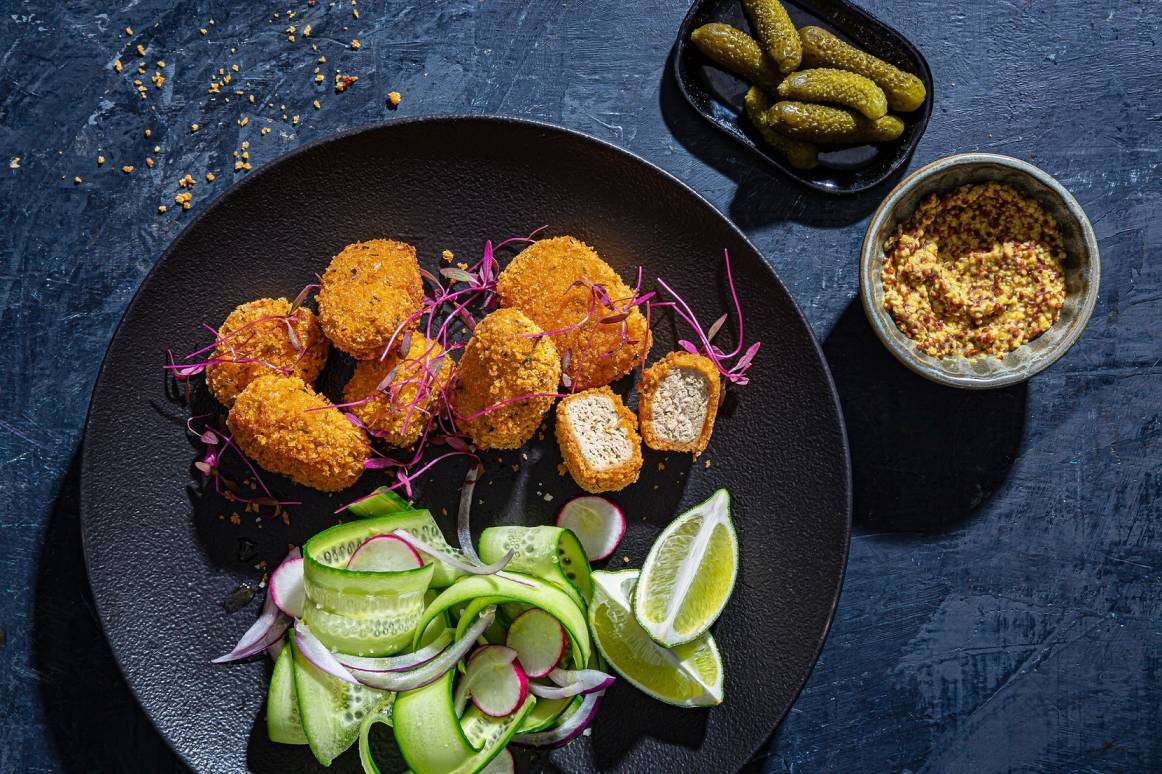Better Bioeconomy Weekly - Jul 17th 2023 🌏
Could Coldplay be the first band to feature cultivated meat on their concert tour?
BIO BUZZ
📈 Governments worldwide drive public funding for alternative proteins, surpassing $1 Billion in support
Public funding for alternative proteins has significantly increased, with governments worldwide doubling their investments in 2022, surpassing $1 billion in public support for the alternative protein ecosystem.
Governments invested $635 million in the alternative protein ecosystem in 2022, with allocations for research and development, commercialization, and mixed initiatives.
The US, Singapore, and Australia/New Zealand made advancements in the regulatory approval process for cultivated meat, while efforts to restrict alternative protein sales through labelling restrictions were largely rejected or overturned in courts, except for a plant-based cheese ban in Türkiye.
Read the State of Global Policy Report - Good Food Institute
💰 Strategies for cost reduction in cultivated meat to achieve price parity
With already commercialized technology and approaches, cultivated meat can reach a price of $29.5/lb, which is comparable to whole cuts like filet mignons and tenderloins. However, it is still 6 times more expensive than ground beef.
Four key strategies to bring down the cost of cultivated meat below $29.5/lb:
1) reducing the cost of media
2) improving biomass yields
3) optimizing the bioprocess
4) reducing capital spend through larger bioreactorsReducing the cost of media is highlighted as the biggest contributor to lowering the cost of goods sold (COGS). Achieving a cost of around $1/L, along with other improvements, can help cultivated meat reach price parity.
Read full article - Ark Biotech
🌏 New study provides a framework for sustainable protein production in Asia
The study by Asia Research and Engagement (ARE) identifies GDP per capita, age demographics, and population as key factors influencing meat, dairy, seafood, and egg consumption.
Eliminating deforestation, peaking industrial production, and scaling alternative proteins are the most effective mitigation measures across all markets.
Achieving climate safety by 2060 requires a market share of alternative proteins between 40-90%, depending on the market, and the elimination of deforestation and other industrial animal production practices.
Read full article - Green Queen
🇯🇵 Nissin Food is launching a plant-based version of “kabayaki” grilled eel, addressing the declining stocks and overfishing of Japanese Eel
Nissan will debut the new eel before Japan’s Day of Ox celebrations when most people enjoy the delicacy.
The plant-based eel replicates the taste, texture, and appearance of real grilled eel using soy protein and other plant-derived ingredients. The company has developed a unique three-step process to create the plant-based eel, involving steaming, coating with sauce, and grilling.
The new eel will be available for purchase as a set with sauce and “sansho” Japanese pepper, with 1,000 sets offered via its online store from July 18 onwards at a price of 1,620 yen (~$12).
Read full article - vegconomist
🍅 Norfolk Plant Sciences gained FDA approval for its genetically modified purple tomatoes rich in antioxidants
The FDA's "no questions" letter indicates that the purple tomatoes pose no additional safety risks compared to conventional tomatoes.
NPS plans to launch a range of purple tomato products, including fresh tomatoes and seeds for home gardeners and believes the regulatory consultation process is important for building public trust in new products.
GM purple tomatoes have purple flesh and skin due to the activation of genes from the snapdragon flower, resulting in higher levels of antioxidants and extended freshness, which distinguishes them from commercially available tomatoes.
Read full article - AgFunder
⚡️ Calysta is producing "protein without limits" by converting methane into single-cell proteins
Driven using a patented fermentation platform, the process is powered by renewable energy and has lower water and energy consumption compared to conventional proteins.
The California-based company initially focused on producing food for fish, livestock, and pets, but has now developed Positive Protein for use in human foods, which is highly nutritious with the best possible digestibility rating for protein ingredients.
Calysta opened a pilot facility in Teeside, England in 2016, with a £2.8 million grant from the UK government. They raised $30 million from Cargill that year and an additional $40 million from investors in 2017. Recently, Calysta launched a commercial-scale facility in Chongqing, China, capable of producing 20,000 tonnes of product per year.
Read full article - vegconomist
🇸🇪 Mycorena aims to drive global expansion by introducing mycoprotein-based products in key European markets
Mycorena is collaborating with industry leaders such as Rebl Eats, Meeat Food Tech Oy, Revo, and RIP Foods to establish a niche in the food industry in Austria, Finland, France, Spain, Sweden, and the Netherlands to unlock the market potential for its mycelium-based protein.
The company has successfully launched a range of products in various markets, generating nearly 60,000 servings of its Promyc-based products.
Mycorena's strategic partnerships aim to elevate the alternative food segment by leveraging innovative products and technologies, targeting a broader market beyond vegans.
Read full article - Green Queen
🤝 Magic Valley and Biocellion SPC partnered to enhance bioreactor design for optimized cultivated meat production
Magic Valley has developed a method using a minor skin biopsy to create animal component-free cultivated lamb from induced pluripotent stem cells (iPSCs), claiming to be the first company to achieve this.
The collaboration between the two companies, coupled with Biocellion's computer simulation technology, aims to offer more efficient and cost-effective R&D opportunities for scaling cultivated meat and protein alternatives.
The partnership aims to revolutionize meat production by focusing on sustainability, ethics, and creating delicious cultivated meat products efficiently at scale.
Read full article - Green Queen
🇮🇱 SimpliiGood launched chicken nuggets made primarily from microalgae, offering a taste and texture similar to conventional chicken
The nuggets have a higher nutritional value and a smaller environmental impact compared to conventional chicken. Microalgae are rich in proteins, fatty acids, vitamins, and minerals, and require less land, and water than traditional livestock production.
The vegan meat developed by SimpliiGood consists of 80% fresh spirulina and prebiotic fibers, offering a clean and nutrient-rich option that sets a new standard in incorporating microalgae nutrition into everyday diets.
SimpliiGood aims to commercialize the chicken analogue next year, expanding its spirulina production capabilities and partnering with Haifa Group Ltd. to ensure a consistent supply and efficient market response time.
Read full article - Green Queen
🥔 Veg of Lund and Haofood have signed a collaboration agreement to sell DUG potato milk in China and selected markets in the region
Haofood has a successful track record in the Chinese plant-based market, with its peanut-based chicken alternative securing listings at thousands of stores across the country since launching in 2021.
Veg of Lund's DUG potato milk was introduced in 2021 and saw sales rise by almost 50% throughout the year, before launching at UK supermarkets Waitrose and Ocado and Swiss retailer Migros in 2022.
At the start of 2023, Veg of Lund improved the recipes for its DUG potato milk and secured a patent for its potato emulsion, enhancing the creaminess of the milk alternatives.
Read full article - vegconomist
📚 Heura collaborated with 450+ schools across the Iberian peninsula to introduce plant-based meat into school meals
The company worked with parents, chefs, and directors to educate children about the benefits of plant-based meat, emphasizing its nutritional advantages, and aiming to increase its consumption among schoolchildren.
The program's goal is not only to provide an alternative to meat but to offer a substitute that surpasses meat in various aspects, promoting healthier habits and behavioural change.
Heura's program includes education through training workshops, written and video materials, and training sessions for school staff to ensure the best culinary experiences with plant-based meat.
Read full article - Food Navigator
🏷 10 labelling learnings from a regulatory expert for plant-based brands going global
Provide product information in the local language of the target country to ensure understanding and compliance with regulations.
Consider cultural differences and traditions when labelling products to avoid backlash and legal issues.
Tailor messaging to reach a diverse range of consumers, including omnivores, flexitarians, vegans, and vegetarians.
Read all 10 learnings - Green Queen
Hungry for a weekly feast of news and updates on the future of food? Devour our free subscription! 👇🏾
BIO BUCKS
💰 Perfect Day to sell its consumer products arm, The Urgent Company, to focus on its core competencies as a B2B supplier

The creation of The Urgent Company and its consumer brands was intended to stimulate market interest in animal-free dairy and demonstrate the viability of dairy proteins made via fermentation.
The decision to move away from consumer products does not mean the brands are not valuable assets, but rather reflects a strategic shift to prioritize the B2B business.
Perfect Day is in talks with interested parties, including CPG companies and financial buyers, for a potential path forward for The Urgent Company, either as a whole business or individual brands.
Read full article - AgFunder
🇦🇹 After raising $5 million, Fermify has extended its Seed funding round and formed alliances with CREMER and Interfood
The partnerships with multinational corporations CREMER and Interfood aim to accelerate Fermify's path to becoming the world's leading provider for precision fermentation technology.
Fermify's precision fermentation process enables the large-scale production of animal-free cheese, and the partnerships will hasten the market introduction and development of this product.
CREMER will collaborate with Fermify to develop media-feeding solutions for precision fermentation processes, while Interfood aims to expand its portfolio with sustainable alternatives and promote ecological sustainability in dairy production.
Read full article - Green Queen
🇨🇦 Protein Industries Canada is offering $10M CAD for food tech projects that use AI to enhance plant-based food production
The funds are aimed to accelerate commercialization and improve efficiency and sustainability in Canada's plant-based sector. Since its establishment five years ago, PIC has invested nearly $500M CAD in multiple Canadian startups and research projects focused on accelerating plant protein.
AI can transform food ingredient processing and manufacturing by speeding up formulation, ensuring food safety, and enhancing quality, according to PIC. PIC will invest $30 million in AI projects for plant-based and agrifood sectors by March 31, 2026.
Recently, PIC formed a partnership with Wageningen University & Research, aiming to share information and facilitate the shift to sustainable alt proteins.
Read full article - vegconomist
🇵🇪 Nutri Co raised $1M in a pre-Series A to expand its AI plant-based food production
The funds will be used to expand AI plant-based food production and enter the Mexican market. The round was led by MrPink VC, White Lions, Terraflos Inc, and Artfo Holdings.
Nutri Co's AI technology, Virgilio, accelerates the creation of plant-based superfoods and targets products like shakes, cookies, and cereal bars.
“Our objective is to triple the company’s sales from 2022 and scale out operations in Mexico. In addition, we’re already closing strategic deals with main supermarket chains and convenience stores,” Nutri Co-founder and CEO, Daniel Nuñez
Read full article - LatamList
Got a taste for this newsletter? Dish it out to your friends!👇🏾
SOCIAL FEAST
🎤 Could Coldplay be the first band to feature cultivated meat on their concert tour?
Recently, the band published a sustainability report for their concert tour. The report featured numerous sustainability initiatives, including:
Kinetic energy-powered dance floors for fans
Plastic-free water containers and water refill stations
Default meatless and plant-based catering options
Support for innovation in cultivated meat
Alt proteins companies can greatly expand its consumer reach by connecting the music community with cultivated and plant-derived choices.
“If we want to change how we eat, we need to build a new culture around it. That means celebrities, musicians, and actors have a valuable, crucial role to play as role models.”
Read full post - Jennifer Stojkovic
🇪🇺 Three key takeaways from EU novel food approval compared to the US and Singapore
Safety data analysis and approval processes vary significantly between the US, Singapore, and the EU, creating challenges for companies in the EU, as predicting approval timelines and staying up-to-date can be difficult.
The EU's approval process for novel foods involves a committee with representatives from all member states, and the final decision is influenced by socioeconomic factors rather than solely focusing on food safety.
Despite its complexities, the European food safety standards are widely regarded as some of the highest globally, offering valuable lessons. Ideally, an optimal system would combine the EU's thoroughness with Singapore's agility and speed in approval processes.
Read full post - Marina Schmidt
🤔 Plant-forward or alt meats? Both!
Meat alternatives can be a good option for individuals looking to reduce their animal consumption, particularly for those who consume sausages, burgers, bacon, etc. The availability of these alternatives can help reduce the demand for intensively farmed meat products.
Plant-forward alternative recipes can be a suitable choice for individuals who use whole meat as an ingredient. This approach can potentially encourage a shift in eating behaviour for those resistant to meat alternatives.
The focus should be on ensuring that both meat alternatives and plant-forward options are healthy, delicious, and sourced sustainably. Understanding the role of herbivores in healthy ecosystems and regenerative settings is also important.
Read full post - Simon Day
EAR FOOD
👩🏻💼 From Lawyer to Climate Champion: Beatriz Franco's vision for a greener food industry
Show: Sound Funding
Guest: Beatriz Franco, Managing Partner at Vita Vera Ventures
Beatriz, who has a background in law and investment banking, made a significant career shift to combat climate change by investing in early-stage companies in the food industry.
Her fund aims to reduce GHG emissions by utilizing innovative food technologies, minimizing food waste and plastic usage, and improving the efficiency of materials and processes.
The conversation explores the reasons why food is frequently disregarded by investors in climate technology and why the food system is both a contributor and a casualty of climate change.
🧬 The Purple Tomato: A journey into the fascinating world of genetically modified foods with Nathan Pumplin
Show: Grow Everything Biotech
Guest: Nathan Pumplin, CEO of Norfolk Healthy Produce
Nathan Pumplin is a pioneer in the field of synthetic biology and food innovation.
This episode delved into the fascinating world of genetically modified foods, with a special focus on a unique purple tomato.
The conversation explores the intersection of biotechnology and agriculture, the challenges and opportunities of sustainable farming, and the role of culinary experiences in introducing new food products.
VISUAL DELIGHT
🐓 Allison Aubrey talks with Dr Valeti about Upside Foods on CBS Sunday Morning
“This (walking away from his promising career in medicine) seems very unreasonable to everybody in the world…but I think we'll need people who are unreasonable to be able to change what we don't like in this world." - Dr Uma Valeti, CEO and Founder of Upside Foods
That’s all for this week. Take care and have an awesome week! 🙌🏾
Got any ideas on how I could improve the newsletter? Your input is super valuable to me. Drop me a line or two on LinkedIn or Twitter and let's start a conversation!








